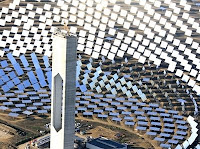Japan is one of the countries that more consumes energy, mostly fossil energies. The consequences of being one of the most developed countries in the world are not easy to face. The price to pay for that amount of energy is too high.
This morning I read on the newspaper an article about a Japanese megalomaniac Project. Which consists, basically, in send an enormous central of photovoltaic panels to the space, where the production of electric energy would be five times more than in the Earth.
But how to send energy from the space to Earth? The scientists are thinking to use microwaves to transport energy through the space. It’s a very expensive project, and is not easy to make it possible. But it would make Japan even more developed, and the energy prices would be the lowest in the world.
Source: João Nunes in Domingo, November 15 2009
This morning I read on the newspaper an article about a Japanese megalomaniac Project. Which consists, basically, in send an enormous central of photovoltaic panels to the space, where the production of electric energy would be five times more than in the Earth.
But how to send energy from the space to Earth? The scientists are thinking to use microwaves to transport energy through the space. It’s a very expensive project, and is not easy to make it possible. But it would make Japan even more developed, and the energy prices would be the lowest in the world.
Source: João Nunes in Domingo, November 15 2009














